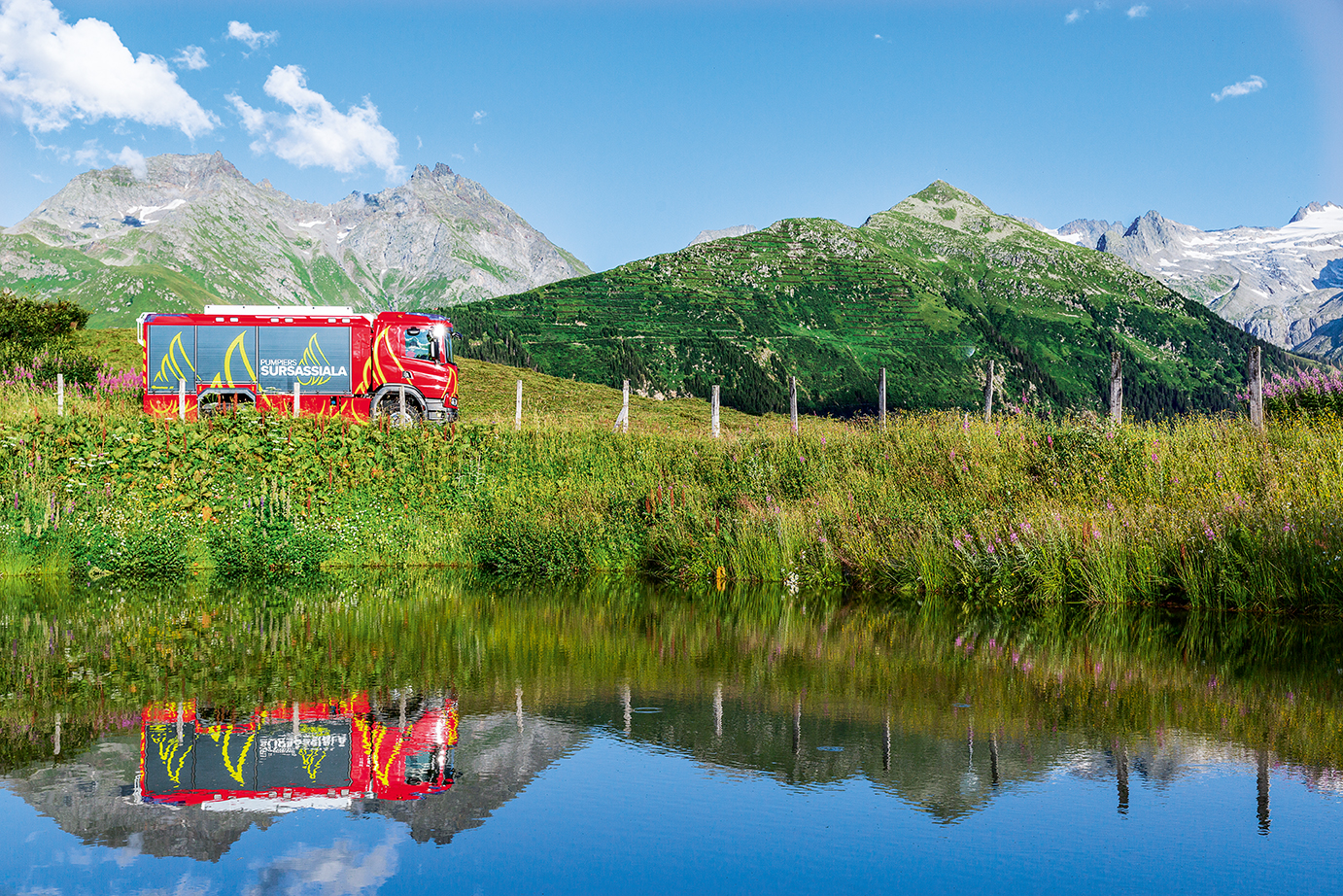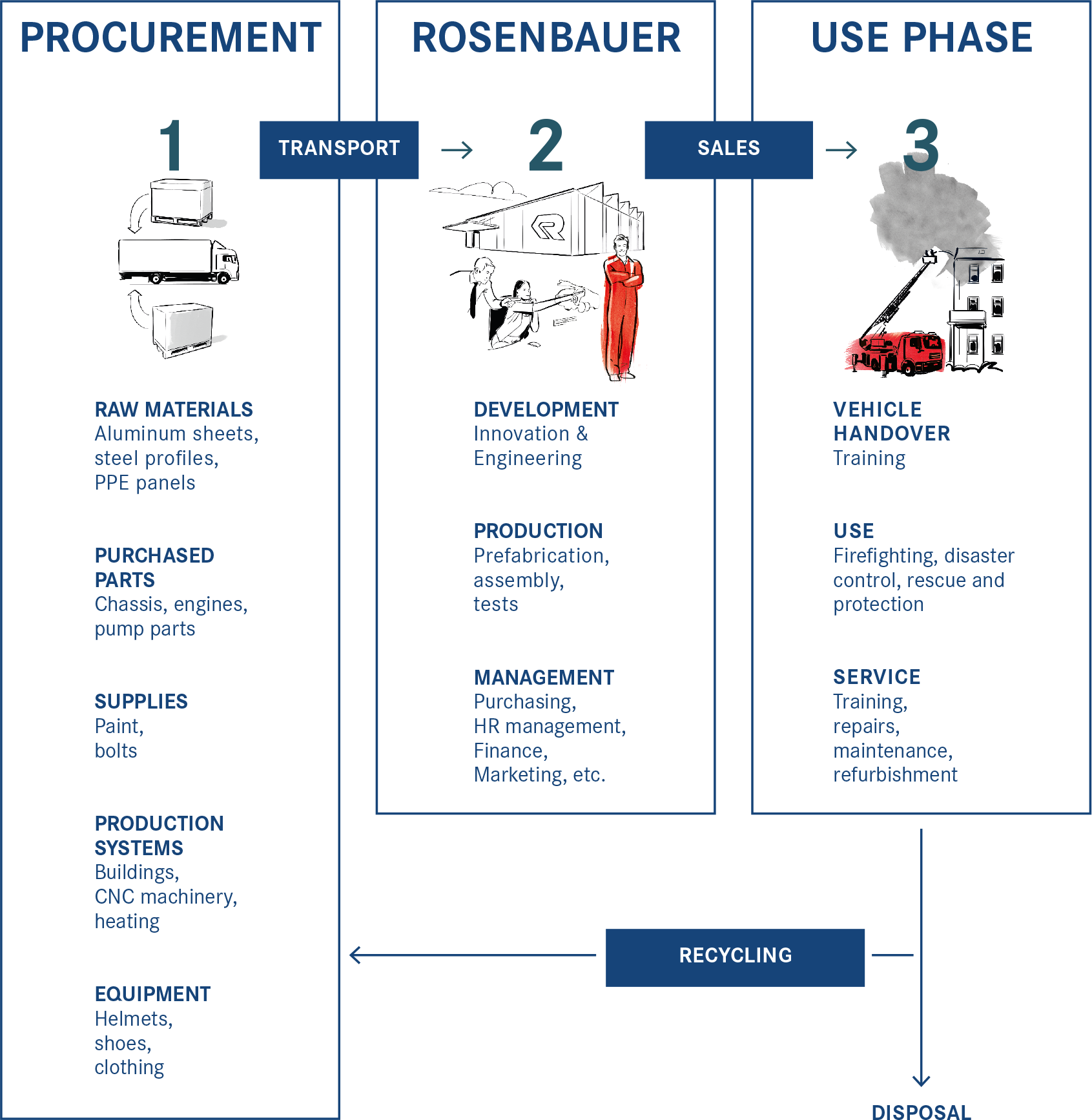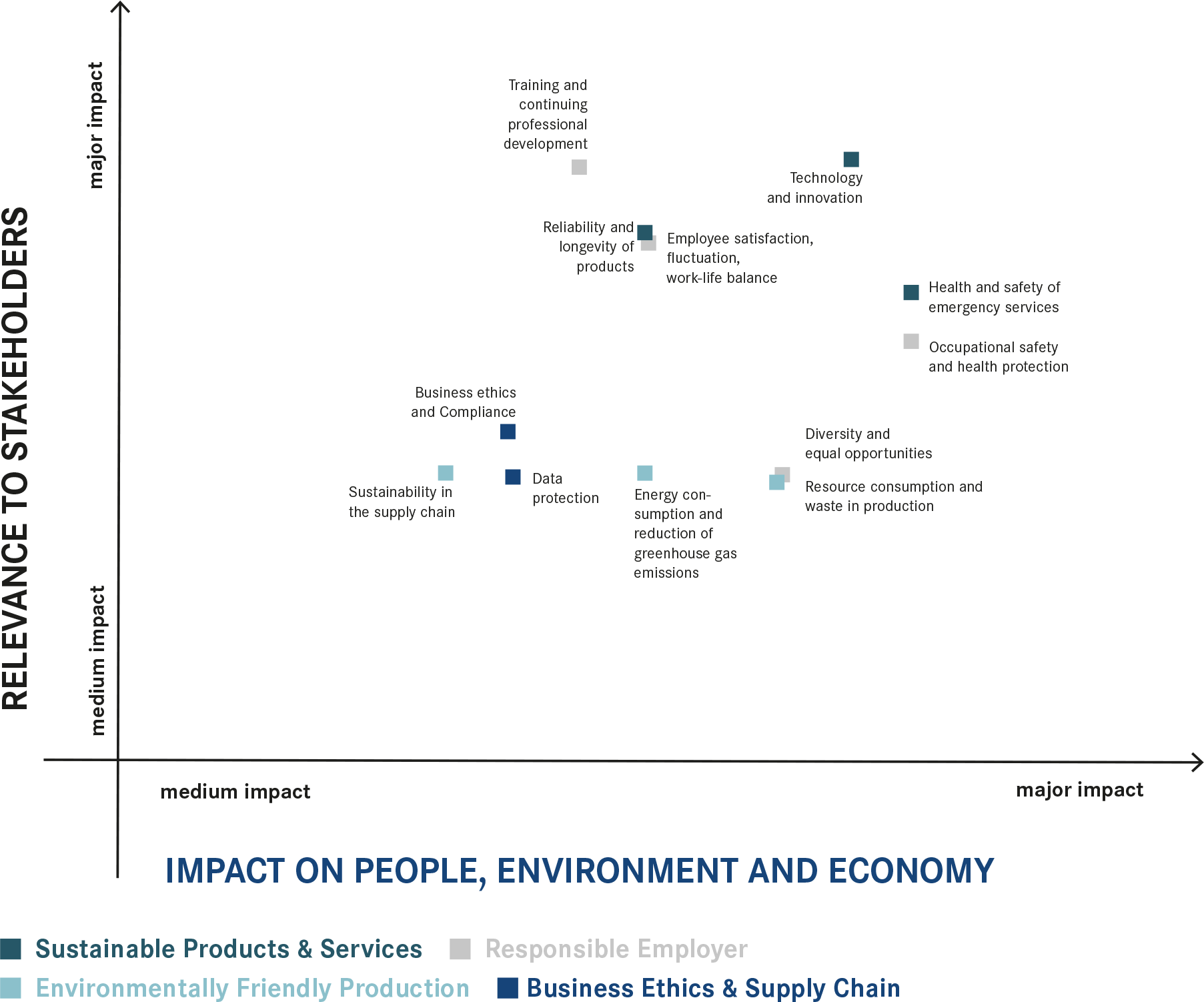Sustainability at Rosenbauer
Ever since its foundation in 1866, Rosenbauer has been one of the most innovative companies in the firefighting industry. The family business has always considered stable growth and responsible, sustainable practices to be a high priority.
OUR SUSTAINABILITY MANAGEMENT
Social and environmental responsibilities have always played an important role in the more than 150-year company history of Rosenbauer. The Executive Board fundamentally rejects shortterm thinking about quarterly results in favor of management decisions with a long-term perspective, which ensure lasting positive growth for the Group.
Sustainability at Rosenbauer is the responsibility of the Executive Board. A sustainability management system was established in 2016 to embed these principles into the organization in a centralized way. The system is assigned to the Investor Relations division, which reports to the Executive Board. This is where measures taken to date are consolidated and systematically incorporated into goal-setting processes, and new initiatives are launched. Equally important is reflecting current trends and new topics of interest and gauging these for relevance to the sustainability program and the company’s business success.

»We act intelligently for a sustainable future. With our goals, we steer our company along the entire value chain.«
Dieter Siegel, CEO
SUSTAINABLE GOVERNANCE
Rosenbauer considers itself a partner. Our cooperation with customers is above all professional and conscientious, and follows internationally accepted guidelines and principles. The sustainable management of our business is built on good corporate governance.
In accordance with the law, the Articles of Association and the Rules of Procedure approved by the Supervisory Board, the Executive Board of Rosenbauer International AG manages the company on its own responsibility. It performs its management duties as required for the good of the company, taking into account the interests of all internal and external stakeholders, in particular those of the owners and employees. At regular meetings it discusses current business performance and makes the necessary decisions and resolutions. A constant and open exchange of information between the members of the Executive Board, management and all employees is one of Rosenbauer‘s key management principles. The Executive Board reports to the Supervisory Board regularly and exhaustively on all relevant issues relating to business development, including risk exposure and risk management in the Group. Furthermore, the Chairman of the Supervisory Board maintains regular contact with the CEO, with whom he discusses strategy and ongoing business development.
As well as monitoring the Executive Board, the Supervisory Board also sees it as its duty to support the Executive Board in its management of the company, particularly in decisions of fundamental significance. All members of the Supervisory Board attended more than half of the meetings of the Supervisory Board in the reporting period.
Further information on the composition and working methods of the Executive Board and Supervisory Board, and on Rosenbauer‘s diversity policy can be found on page 26 et seq. of the 2020 Annual Report.
RISK AND OPPORTUNITY MANAGEMENT
Comprehensive risk and opportunity management is a vital pillar of responsible corporate governance. Rosenbauer takes care to include all business units and corporate divisions in this system. Responsibility for risk policy is borne by the Executive Board. The ongoing identification, assessment and management of risks are an integral part of the management, planning, and controlling process.
During compilation of the annual Sustainability Report, social and environmental risks and opportunities are identified and their impact assessed. None of the sustainability risks were deemed to be of significance.
Sustainability at Rosenbauer

MANAGEMENT OF CLIMATE RISKS
In 2020, a third-party consultant helped conduct an analysis of climate-related risks and opportunities for Rosenbauer. The recommendations of the Taskforce on Climate-related Financial Disclosures (TCFD) were applied in this process.
The first step was to identify climate-related risks and opportunities that could potentially be financially relevant to Rosenbauer. These were determined by analyzing publicly available information from peer companies, climate science reports, and other relevant sources. In addition, interviews were conducted with relevant departments in the company such as Risk Management, Purchasing, and Innovation to learn the perspectives and experiences of a diverse group of internal stakeholders.
TCFD distinguishes between risks and opportunities from the social, technological, and political transition to a decarbonized economy (transition risks/opportunities) and those resulting from physical changes in the climate system (physical risks/opportunities). Physical risks and opportunities are additionally broken down into acute and chronic categories.
The identified climate-related risks and opportunities were subjected to an analysis of the financial effects on Rosenbauer and the likelihood of occurrence. This analysis was designed and performed in close cooperation with Risk Management at Rosenbauer to ensure the feasibility of the process and results. The plan is to incorporate the identification and analysis of climate-related risks and opportunities into the annual risk management process.
The physical risks to Rosenbauer’s production and assembly locations were identified as the material climate-related risk. The most important climate-related opportunity is the generally increasing need for fire protection products and the opportunities for new Rosenbauer products and services. A TCFD scenario analysis was conducted to determine the possible effects of future climate changes on Rosenbauer.
ROSENBAUER’S VALUE CHAIN
In order to live up to its responsibilities in the field of firefighting and disaster control, Rosenbauer incorporates sustainability issues into every aspect of its strategy. The focus is on the areas which the company can be instrumental in shaping.
The life cycle of a firefighting vehicle begins with the production of the primary raw materials, steel and aluminum, and extends from in-house production to use by firefighters and recycling of obsolete materials.
Value chain

MATERIAL SUSTAINABILITY TOPICS
In an analysis of the value chain, Rosenbauer has identified numerous topics in which social and/or environmental impacts stem from the company. This materiality analysis was updated in 2020. In order to weight the sustainability topics in the value chain, the stakeholder groups who have a connection to Rosenbauer were invited to complete an online survey in the reporting period. These included customers, suppliers, employees, management, and investors. The materiality matrix provides a summary of the survey results. The material sustainability topics are those with the greatest importance for stakeholders and the largest impact on people, the environment, and the economy. This Report provides qualitative and quantitative disclosures according to the GRI Standards on all of these topics.
Due to the update, the material sustainability topics have changed compared to 2019. Some topics were renamed, consolidated, or newly included. A major change occurred in the former COMPLIANCE action area. This was renamed BUSINESS ETHICS & SUPPLY CHAIN and now includes the material topics of Compliance, Sustainability in the supply chain (formerly: environmental management at suppliers), and Data protection. ENVIRONMENT & RESOURCES was renamed Environmentally Friendly PRODUCTION, which covers Energy efficiency & reduction of greenhouse gas emissions and Resource consumption in production. The EMPLOYEES and PRODUCTS AND SOCIETY action areas were renamed RESPONSIBLE EMPLOYER and SUSTAINABLE PRODUCTS & SERVICES.
Materiality matrix

OUR SUSTAINABILITY STRATEGY
Sustainability at Rosenbauer is the responsibility of the Executive Board as part of the corporate strategy. That means clear responsibilities and resources have been defined, and sustainability has been integrated into all core processes. The Sustainability Strategy is implemented and evaluated by CSR management in accordance with the goals and measures determined annually.
Rosenbauer‘s sustainability strategy is based on the existing Mission Statement and values in conjunction with the corporate strategy. Opportunities and risks arising from societal megatrends are important elements that were also considered. The analysis of the value chain and identification of material topics in terms of the impact on people, the environment, and the economy were the most important factors for defining the sustainability strategy.
Based on this foundation, 2017 was set as the starting point for Rosenbauer‘s Sustainability Strategy. Working with all members of the Executive Board and operational managers, the relevant areas of activity were defined and corresponding guiding principles developed. In 2020, the sustainability goals and measures were completely revised and updated. Clear KPIs guarantee measurability and a way to review and manage processes. The inclusion of all operational managers and in-depth discussions of the topics enabled a broad consensus on the direction Rosenbauer‘s strategic sustainability efforts should take in the coming years.